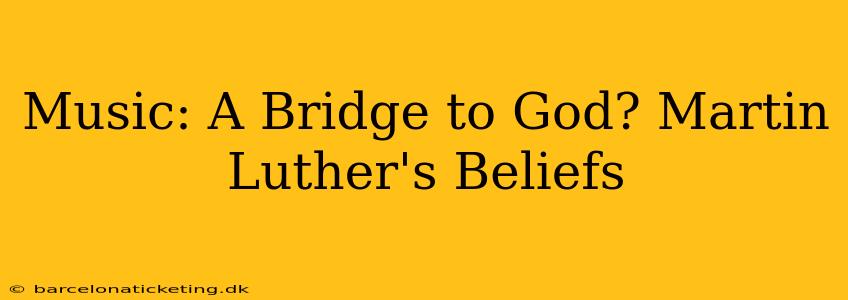Martin Luther, a towering figure of the Protestant Reformation, held profound beliefs about the power of music, viewing it not merely as entertainment but as a vital tool for spiritual growth and a direct connection to God. His impact on the development of church music was immense, shaping the way Protestant churches approach worship to this day. This exploration delves into Luther's perspective on music's role in faith, examining his theological underpinnings and lasting legacy.
What was Martin Luther's view on music?
Luther saw music as a divine gift, a powerful means of expressing faith and fostering piety. Unlike some theological perspectives that viewed music with suspicion, Luther embraced its potential to uplift the spirit and connect believers to the divine. He believed that music, particularly congregational singing, could unite hearts and minds in worship, fostering a sense of shared faith and community. He emphasized the importance of simple, accessible melodies that could be easily learned and sung by all, regardless of musical skill. This democratization of church music was a radical departure from the complex polyphony prevalent in the Catholic Church.
Did Martin Luther compose music?
While not a professional composer in the same vein as Bach or Handel, Luther did compose several hymns himself, most famously "A Mighty Fortress Is Our God" (Ein feste Burg ist unser Gott). This hymn, imbued with strength and unwavering faith, became a rallying cry for the Protestant movement and remains a powerful testament to Luther's beliefs. His compositions were characterized by their straightforward melodies and deeply theological lyrics, reflecting his commitment to making worship accessible to everyone.
How did Martin Luther use music in his theology?
Luther's theological perspective on music stemmed from his understanding of God's creation and the human spirit. He saw music as a natural expression of human joy and sorrow, a gift from God to be used in His service. His emphasis on congregational singing reflected his belief in the priesthood of all believers, empowering individuals to actively participate in worship rather than passively observing it. This active participation, through singing, prayer, and scripture reading, was seen as a crucial aspect of a deeply fulfilling spiritual life.
What is the significance of Luther's hymns?
Luther's hymns, alongside those written by his contemporaries, played a crucial role in shaping Protestant worship. They provided a vehicle for expressing theological truths in a memorable and engaging way, making complex doctrines accessible to ordinary people. This focus on accessible and understandable language and melody helped spread Luther's ideas and strengthened the Protestant movement. Many of his hymns are still sung today, demonstrating their enduring power and relevance.
How did Luther's beliefs about music affect the development of Protestant church music?
Luther's influence on Protestant church music is undeniable. His emphasis on congregational singing led to the development of chorales, simple, four-part harmonies that could be sung by the entire congregation. This contrasted sharply with the elaborate polyphony of the Catholic Church, fostering a more egalitarian and participatory style of worship. His focus on clear, understandable texts ensured that the hymns served not only to entertain but also to teach and strengthen faith. His legacy is clearly heard in the congregational singing that forms a core element of Protestant services worldwide.
What are some examples of Luther's hymns?
Beyond "A Mighty Fortress Is Our God," Luther penned other impactful hymns, including "Out of the Depths I Cry to Thee" and "Now Thank We All Our God." These hymns, reflecting various aspects of faith and devotion, continue to inspire and uplift believers centuries later, underscoring their lasting theological and musical significance. Their enduring popularity speaks volumes about the power of Luther's musical vision and its resonance with generations of worshippers.
Conclusion:
Martin Luther's belief in music as a bridge to God profoundly impacted the development of Protestant church music and continues to shape Christian worship today. His emphasis on congregational singing, his composition of powerful hymns, and his theological grounding of music's role in faith serve as a testament to his vision of a participatory and accessible religious experience. His legacy reverberates through the melodies sung in churches across the globe, a lasting echo of his profound faith and belief in the power of music to connect humanity with the divine.

